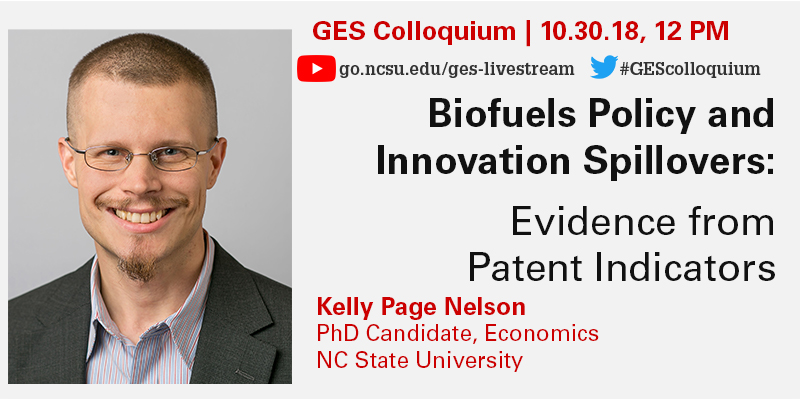
- This event has passed.
Kelly Nelson – Biofuels Policy and Innovation Spillovers: Evidence from Patent Indicators

Biofuels Policy and Innovation Spillovers: Evidence from Patent Indicators
Speaker:
Kelly Nelson, PhD Candidate, Agricultural and Resource Economics (CV)Abstract:
In the late 1990s and early 2000s, governments implemented policies stimulating the use ethanol and biodiesel to reduce carbon emissions and encourage domestic energy production. Blend mandates, requirements that gasoline or diesel sold contain a minimum percentage of these biofuels, were the most common form of policy. A recent meta-analysis by Hochman and Zilberman (2018) on United States ethanol blend mandates found them successful in lowering emissions and imports of fossil fuels. A theoretical study by Clancy and Moschini (2017) concluded that, if innovation were stimulated by mandates, then the socially optimal mandate percentage is higher than if innovation is not possible. We test the impact of blend mandates and other biofuels policies on innovation using bibliometric patent indicators that correspond with research effort and research output. We also consider the impact on R&D directed toward plant biotechnology. Our analysis shows that ethanol mandates significantly increased both R&D effort and quality-weighted innovation output in biofuels while reducing the R&D inputs to plant patenting. This suggests that biofuels innovation increased in response to the mandates but that firms substituted R&D effort toward biofuels and away from plant technologies. However, output of plant innovation did not change in response to the ethanol mandates, supporting the presence of a spillover effect between biofuels innovation and plant innovation. Biodiesel blend mandates did not have significant impact on R&D efforts in any category. Policies other than mandates had inconsistent effects, ranging from limited increases in R&D activity to significant decreases in innovation.Bio:
Kelly Nelson’s research focuses on the determinants of innovation in the biotechnology and energy sectors. He has studied the impact of biofuels policies on patenting in the biofuels and plant biotechnology fields. Another project focuses on the impact of nuclear power accidents on nuclear energy research and development. He is also investigating the impact of grain market concentration on the variety of research done by agricultural biotechnology firms. Kelly holds an MS in global affairs from New York University and a BA in history from the University of Maryland, College Park.WordPress database error: [Unknown column 'wp_tec_occurrences.start_date' in 'SELECT']SELECT SQL_CALC_FOUND_ROWS wp_posts.*, CAST( wp_tec_occurrences.start_date AS DATETIME ) AS event_date
FROM wp_posts LEFT JOIN wp_term_relationships ON (wp_posts.ID = wp_term_relationships.object_id) LEFT JOIN wp_postmeta ON ( wp_posts.ID = wp_postmeta.post_id AND wp_postmeta.meta_key = '_EventHideFromUpcoming' ) LEFT JOIN wp_postmeta AS mt1 ON ( wp_posts.ID = mt1.post_id )
WHERE 1=1 AND wp_posts.ID NOT IN (11446) AND (
wp_term_relationships.term_taxonomy_id IN (149,438,538,539)
OR
wp_term_relationships.term_taxonomy_id IN (45)
) AND (
wp_postmeta.post_id IS NULL
AND
( mt1.meta_key = '_EventStartDate' AND CAST(mt1.meta_value AS DATETIME) >= '2026-03-02 02:01:46' )
) AND wp_posts.post_type IN ('post', 'page', 'attachment', 'tribe_venue', 'tribe_events', 'tribe_event_series') AND ((wp_posts.post_status = 'publish'))
GROUP BY wp_tec_occurrences.occurrence_id
ORDER BY event_date ASC, wp_posts.post_date ASC
LIMIT 0, 3